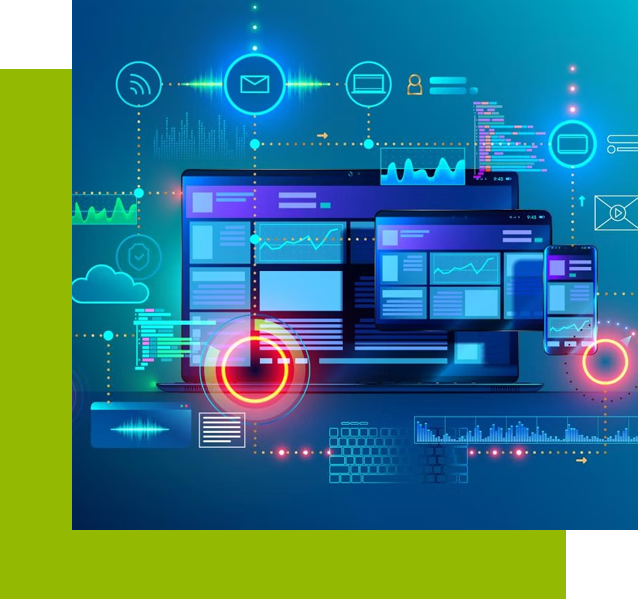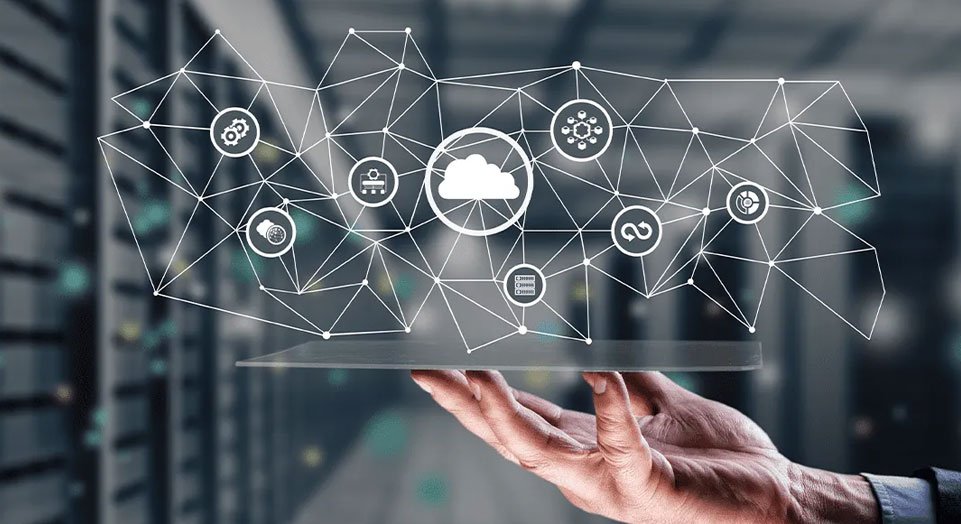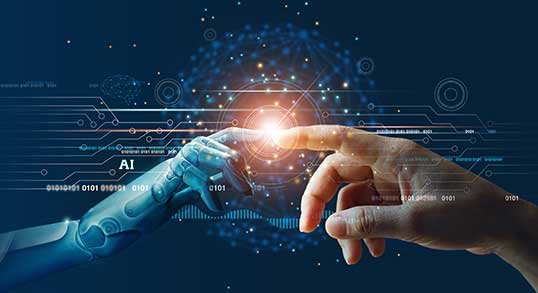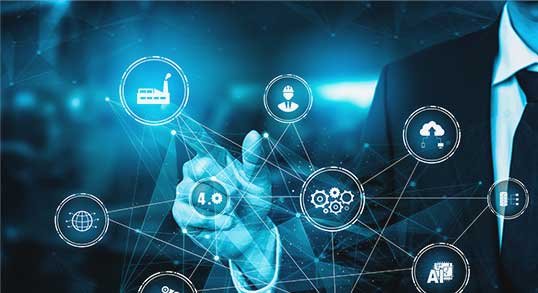Revamp Your Business with Smarter App Modernization
Elevate your tech. Accelerate your success.
Future-proof your growth.

Empowering Innovation Through App Modernization
DextraLabs specialize in breathing new life into outdated applications. Our app modernization services make your systems faster, smarter, and ready for the future. We simplify complex processes to align technology with your business goals. With us, legacy systems become agile tools that boost your efficiency.
Our team uses cutting-edge techniques like cloud migration, microservices, and AI integration. We focus on reducing costs while increasing scalability and performance. Our no-code platforms let you innovate faster without relying on heavy development efforts.
We don’t believe in one-size-fits-all solutions. Instead, we analyze your systems and design strategies tailored to your needs. This helps you transition smoothly and avoid disruptions. Your success drives every step we take.
WHAT WE DO
Challenges we solve
Upgrade Your Outdated Apps for Better
Outdated apps holding you back? Let DextraLabs modernize your legacy systems to drive performance, security, and future growth. Our modernization services help you:
- Boost scalability
- Improve performance
- Tighten security
- Future-proof your business
In today’s fast-paced world, outdated apps not only slow you down but also expose your business to security risks like data breaches and compliance violations. Our app modernization services go beyond simple updates. We enhance security, update infrastructure, and turn your legacy apps into powerful assets that drive success.
Revolutionize Your Legacy Systems
Legacy systems are vital but can limit scalability, security, and functionality. Legacy app modernization is not just an upgrade—it’s about transforming how your apps operate in today’s cloud-driven environment.
Without modernization, legacy applications are vulnerable to:
- Data Breaches
- Compliance Failures
- Operational Downtime
DextraLabs takes a holistic approach to app development and modernization. By upgrading code, re-architecting systems, and integrating advanced security frameworks, we ensure your applications are robust, secure, and future-ready.

We Make Modernization Simple
Expertise and innovation drive everything we do. These core skills make us the right choice for your app development and modernization journey.
Comprehensive Application Modernization Services
- Application Modernization Consulting: Evaluate your legacy systems to identify improvement opportunities, aligning upgrades with your business goals. Maximize existing investments while evolving for future growth.
- Application Reengineering & Re-architecting: Enhance code efficiency and system architecture using modern frameworks, ensuring scalability, flexibility, and security. Technologies like microservices and serverless frameworks make your applications future-proof.
Cloud-Centric Modernization
- Cloud Migration for Legacy Apps: Transition seamlessly to the cloud using flexible approaches:
- Re-hosting: Lift and shift applications without modifications.
- Re-platforming: Make minor changes for optimized cloud performance.
- Cloud-native Implementation: Rebuild apps for cloud-first environments.
- Application Containerization: Improve scalability and integration through containerization, enabling streamlined DevOps and resource optimization.
Advanced Development and Data Solutions
- Automated & Customized Recoding: Modernize apps built with outdated technologies (e.g., COBOL, C++) using advanced frameworks and languages.
- Mobile & Cross-Platform Compatibility: Ensure seamless functionality across devices and platforms for modern app development.
- Data Modernization: Upgrade analytics with secure, scalable solutions like self-service BI and advanced data visualization to make actionable decisions faster.
Ensuring Security and Compliance
- Regulatory Compliance: Meet industry standards like HIPAA, GDPR, and PCI DSS through detailed audits and tailored strategies.
- Security Enhancement: Protect your systems with ISO 27001-certified practices, safeguarding data against modern threats.
- Digital Transformation: Streamline business processes for enhanced efficiency, agility, and ROI through innovative integration and reuse of existing applications.
services We Provide
Explore our custom services
Frequently Asked Questions
Application modernization means updating old software to meet current needs. We enhance the app's performance and capabilities. This involves using new technologies like cloud computing and microservices. The goal is to make the app more efficient and adaptable. By modernizing, we extend its usefulness and value. It helps businesses stay competitive in today's market.
The biggest driver of application modernization is the need for agility. Businesses must adapt quickly to changes. Legacy apps often slow down innovation. Modernizing allows faster updates and better performance. It reduces costs and improves user experience. Staying competitive pushes companies to update their applications.
An example of modernization is moving a local application to the cloud. Imagine a company using an on-premises inventory system. It could be faster and easier to update. They decide to migrate it to a cloud platform. They might refactor the code and use microservices. Now, the system is faster, scalable, and accessible from anywhere. This improves efficiency and reduces costs. The company benefits from modern technology.
Modernizing applications brings many benefits to your business. Old systems can slow you down. They may not meet current needs. By updating them, you improve performance. You reduce costs. You enhance security. Legacy applications often need more flexibility. They can't adapt to new demands. Modern applications are more agile. They allow quick changes. This helps you respond to market shifts. Outdated systems can be expensive to maintain. They consume more resources. Modernizing reduces operational costs. It optimizes resource usage. Security is a concern with old software. Modern applications have better security features. They protect your data more effectively. User experience matters. Modern apps offer better interfaces. They improve customer satisfaction.
- Retire: Some apps are outdated. We can shut them down. This reduces costs and complexity.
- Retain: Some apps still add value. We keep them as they are. We might modernize them later.
- Rehost: Also called "lift and shift." We move the app to a new environment without changing the code.
- Replatform: We make small changes to use a new platform. This improves performance without a major overhaul.
- Refactor: We modify the app's code to enhance features. This increases scalability and efficiency.
- Rearchitect: We redesign the app's structure. We might adopt microservices or cloud technologies.
- Replace: We substitute the old app with a new one. This could be a custom solution or an off-the-shelf product.
These strategies guide us in modernizing apps effectively.
The 5 Rs of application modernization are key approaches to updating applications. They help streamline the modernization process. They are:
- Rehost: We move the app to a new infrastructure without code changes. It's quick and simple.
- Refactor: We adjust the code for better performance. This improves efficiency on modern platforms.
- Replatform: We make minor changes to adapt to a new platform. This unlocks new capabilities.
- Repurchase (Replace): We buy a new solution to replace the old app. This can offer advanced features.
- Retire: We decommission apps that are no longer needed. This simplifies the system and cuts costs.
These methods help us choose the right path for each app.
App modernization patterns are proven methods to update old applications. They provide a roadmap for transformation. Common patterns include:
- Strangler Pattern: We gradually replace parts of the old app with new components. Over time, the legacy system is fully modernized.
- Event Sourcing: We store all changes as a sequence of events. This improves data integrity and system scalability.
- Anti-Corruption Layer: We create a layer between old and new systems. This ensures they communicate without issues.
- Microservices Architecture: We break the app into small, independent services. This enhances flexibility and speeds up development.
- Containerization: We package the app into containers. This makes deployment consistent across environments.
These patterns help us modernize efficiently.
To modernize an app, we follow these steps:
- Assess the Current State: We analyze the app's functionality and technology. This helps identify areas for improvement.
- Define Objectives: We set clear goals. Do we need better performance, scalability, or new features?
- Choose a Strategy: Based on needs, we select an approach like refactoring or rehosting.
- Plan the Process: We create a roadmap with timelines. This ensures a structured transition.
- Implement Changes: We start updating the app. This could involve rewriting code or migrating platforms.
- Test Thoroughly: We test the app to ensure it works well. We look for bugs and performance issues.
- Deploy and Monitor: We launch the modernized app. We monitor it and make adjustments as needed.
By following these steps, we update apps effectively.





